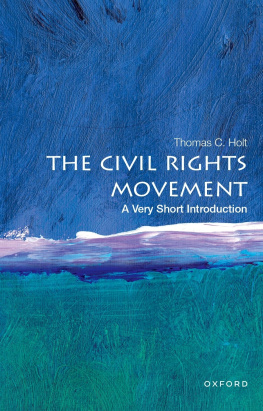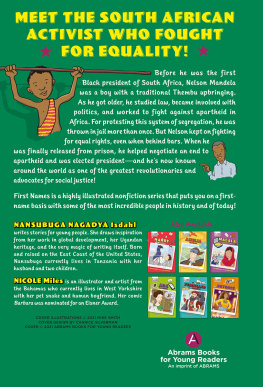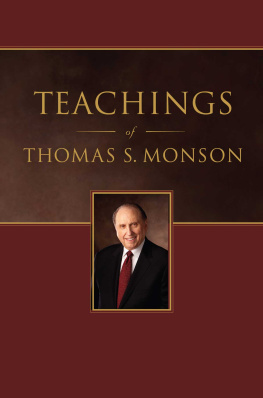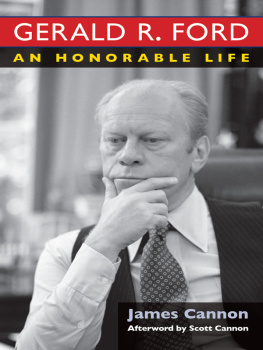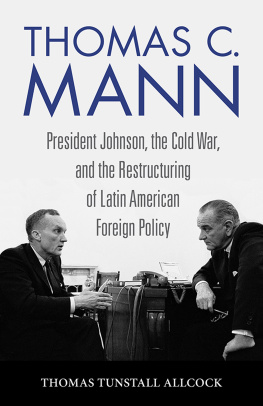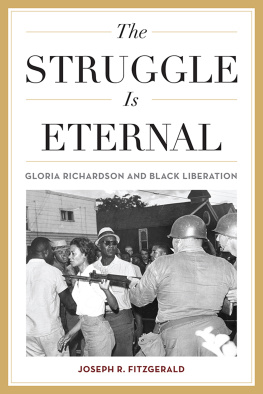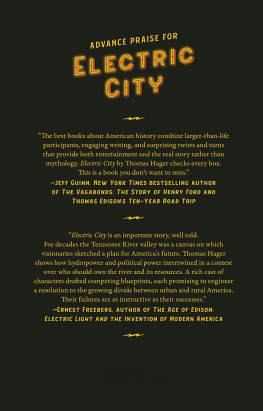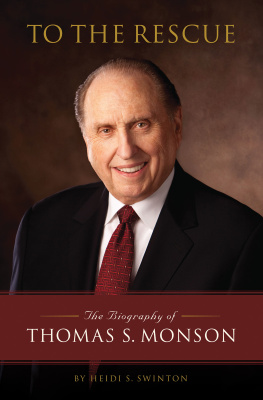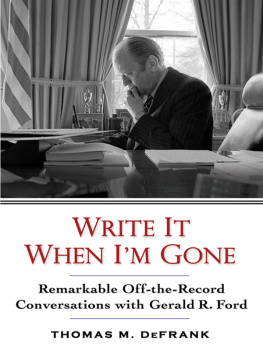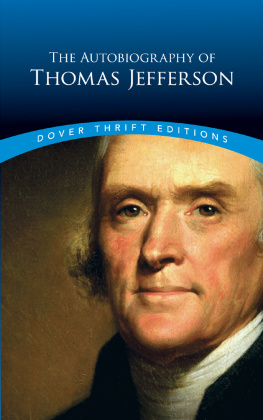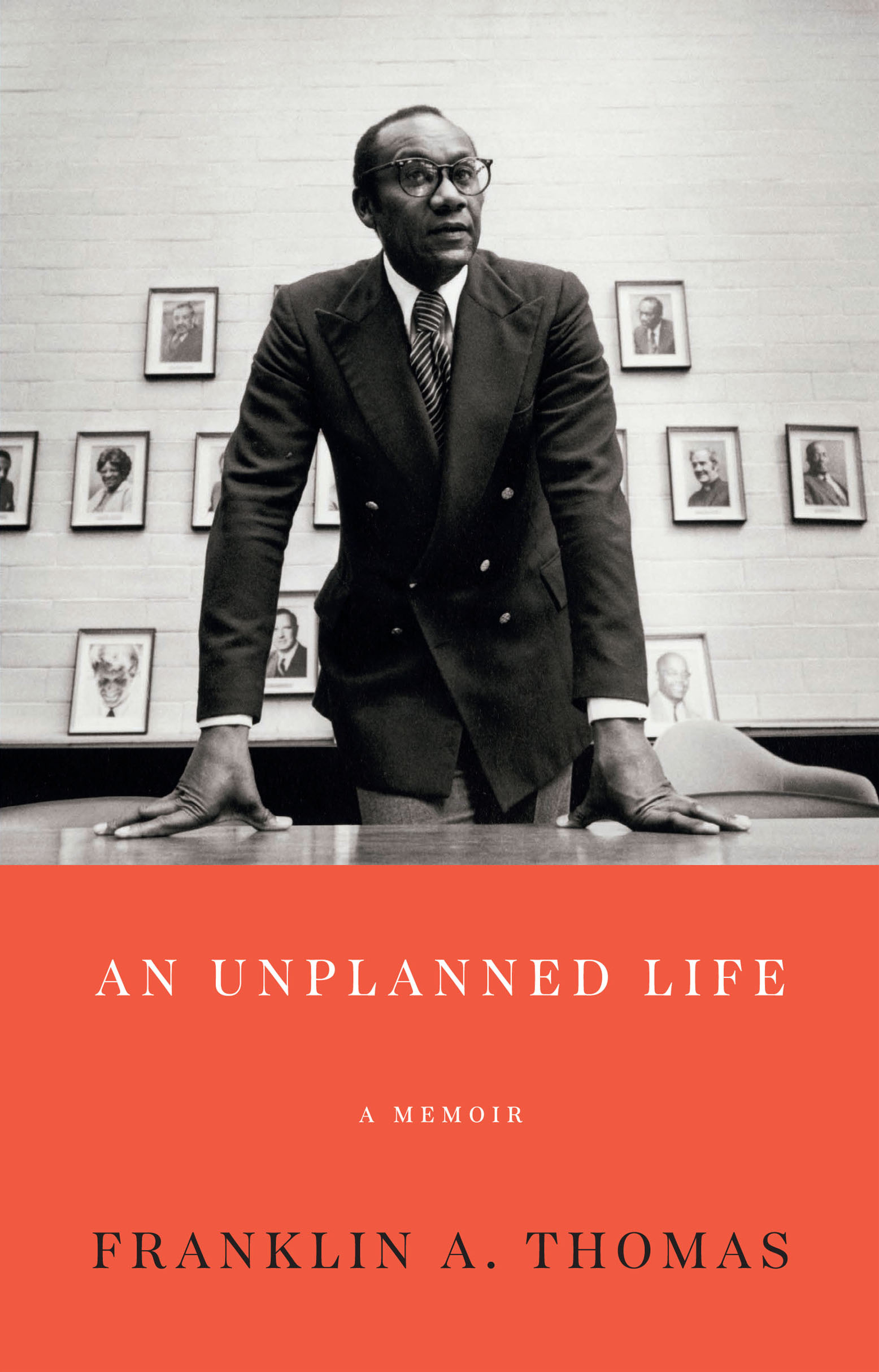Contents
List of Figures
Guide
Pagebreaks of the Print Version
An Unplanned Life
___________________
A Memoir
Franklin A. Thomas

NEW YORK
LONDON
Contents
Foreword
One of my great privileges was visiting regularly with Frank Thomas in his modest office in the Chanin Building, on East 42nd Street. I would walk the few blocks from the Ford Foundation, an institution that Frank stewarded and brought back from the brinkexcited to see him, grateful for the gift of our friendship. I relished our time together. I luxuriated in these opportunities to bask in his glow, to wallow in his wisdom. He gave me the gift of clarity but also confidence.
Through the years, Frank counseled me on dealing with difficult foundation staff who resisted change, on how to build a successful engagement with the Ford trustees, and later, joining boards myself. Frank challenged my thinking, sharpened my ideas, warned me against the arrogance and ego that naturally accrete in any high office, especially in the hallowed halls of large foundations. Even now, I marvel at his discretion, his humility, his equanimity in all things. His wisdom.
He could pull me back, or lift me up, or keep me on trackknowing always what I needed to hear, even if I didnt want to hear it. Frank believed in the human capacity to transform, evolve, and build bridges across lines of ideology and difference.
Of course, we also swapped personal storiesthe latest updates from Vernon Jordan were always at the top of our list. His pride when he talked about his beloved Kate was especially palpable. And he fully embraced me, a gay man, and my partner David, for the people we were and the life we had made together over twenty-six years. When David died suddenly, Frank was one of the first people to reach me.
In short, Frank made an indelible impact on my life. He changed its trajectory. And in this regard, I am hardly alone.
Countless individuals and institutions, even nations, owe a debt to Frank Thomas.
At home:
- The United States Attorneys Office for the Southern District of New York;
- The New York City Police Department;
- The Bedford Stuyvesant Restoration Corporation, the granddaddy of the community-development movement;
- The September 11th Fund.
Across the nation:
- Early in his career, at the agency that later became the Department of Housing and Urban Development;
- The Local Initiatives Support CorporationLISCwhich he helped create;
- And later, on the boards of companies and universities.
And around the world:
- Where Franks partnership with Nelson Mandela modeled the power of truth and reconciliation;
- Where Frank championed the rule of law and values of democracy in South Africas new constitution;
- And, of course, through the Ford Foundationwhich he boldly served and strengthened. Dare I say No Frank? No Ford.
So, what are we to make of a world without Frank, now that he has left us? How are we to inhabit this world that he shaped and improved for us, knowing we feel his absence and miss his voice?
It is difficult to consider our own mortalityour finite, limited time on this earth. We humans tend to have a problem with contemplating such things. But we learn from Frank that the measure of our lives is not how big we are, but how bighearted we are.
That significance, meaning, comes from how we love, not just what we lead. For each of us, if we had only one wish, if only one of our prayers was answered, would it not be to live well, and fully, with joy, and purpose, and grace? Would it not be to liveto leave a legacylike Franks?
Let us resolve, then, to continue as Frank did: To know love and be generous. To be righteous in our cause, but never self-righteous in our character. To advance the slow and steady march of progress. To bend the arc of the moral universe, with our own hands, in our own way, toward justice.
Darren Walker
January 2022
Growing Up in Bedford-Stuyvesant
When I was growing up in the Bedford-Stuyvesant section of Brooklyn, New York, there were two public figures whose pictures were prominently displayed on the walls of our home: my namesake, Franklin D. Roosevelt, and the Queen of England.
FDR was much respected by my family. We would gather in the living room regularly to listen to his radio broadcasts. I was the one who delivered word of his death to my mother after hearing it from a neighbor in April of 1945. The grief in our household was considerable.
The Queen of England was important to us, and to all Barbadians, because Barbados was part of the Commonwealth. I remember a Barbadian telling me that when the Queen was crowned in the early 1950s, someone whod been to London for the coronation came back and described it to a local Barbadian, who replied, Oh, they had a celebration there too? Some say Barbados sees itself as the healthy center of the world, and it is certainly true that a robust self-confidence and proud commitment to education, democracy, and independence are palpable in the country and its people.
I was born in Brooklyn on May 27, 1934, the youngest child of immigrant parents. My father, James Thomas, was born in Antigua and came to the States as part of the group recruited from the Caribbean to help dig the Panama Canal. My mother, Viola Atherley, made her way directly from Barbados at age sixteen.
They met in New York, married, and had six children, two boys and four girls. The oldest, my brother, was born in 1918. When I was three years old my parents separated, but they reconnected some seven years later when my father suffered a stroke and came back to live with us. He died when I was eleven. Not long after, my brother died of pneumonia. From that point forward I was the sole male in our six-member household.
My mother was a strong and capable woman. Nothing seemed beyond her ability to address. She had all kinds of jobs, but she mainly worked as a housekeeper for families in Brooklyn until the war years, when, in addition to handling her daily workload, she went to New York Technical College at night, became a lathe operator, and was hired by the American Can Company in Long Island City to replace the men who had been drafted during World War II. When the war ended in 1945, and the company fired most of the women to provide opportunities for returning veterans and to get back to a more traditional way of operating, my mother resumed work as a housekeeper. She didnt express bitterness about it. She just did what she had to do, and thats pretty much how she ran her life, and our lives too.
I was taught that if you were smart, had good values, and worked hard, there were no limits to what you could do, even though I was growing up in a period of intense racial segregation in many parts of the United States. In our family, education was paramount and teachers were revered. They were viewed as the people who could most help you realize your potential. As a result, no complaints about homework or much else were allowed. During my elementary school years a teacher once slapped my hand. I wasnt sure why and reported the incident to my mother that evening. Did she slap anyone else? she asked. No, I replied. Then just let me know if it happens again. Not many words were spoken but the message was clear. Maybe Id been daydreaming or in some way had inadvertently earned the teachers punishment, but if for some reason I was being mistreated, I could count on my mother to handle it. She would protect me, but with that protection came responsibility.


